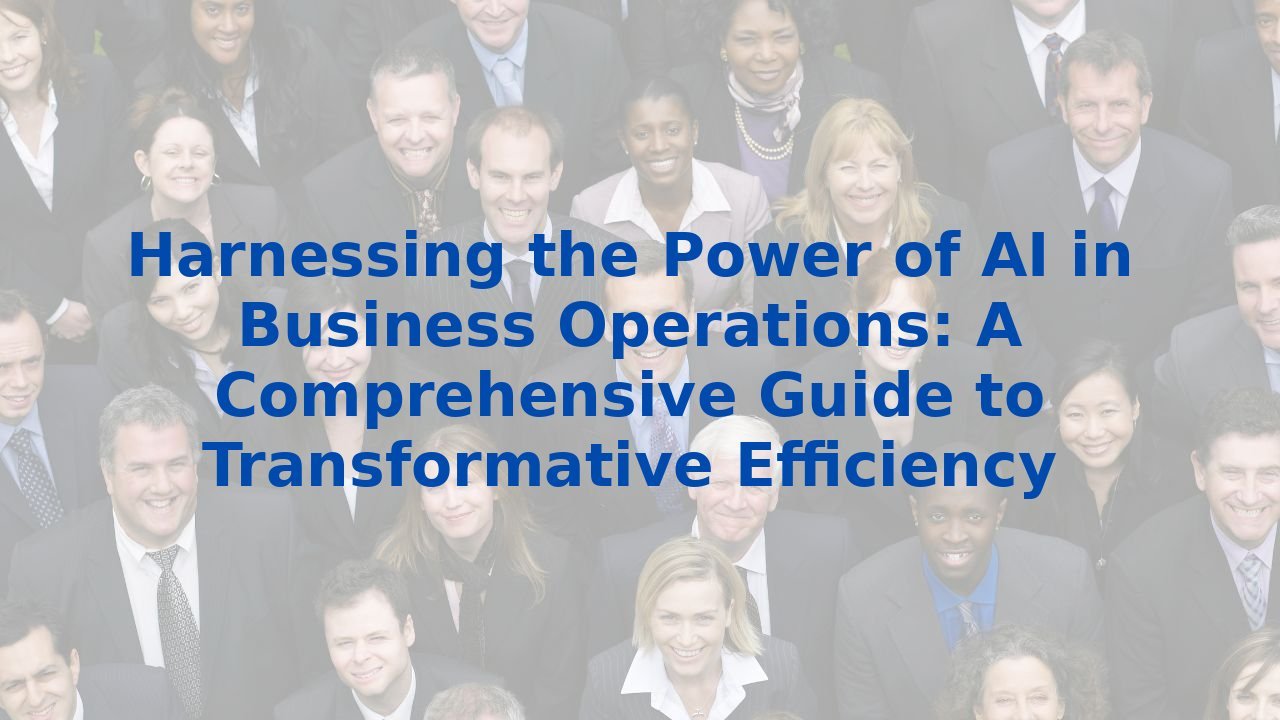Harnessing the Power of AI in Business Operations: A Comprehensive Guide to Transformative Efficiency
Harnessing the Power of AI in Business Operations: A Comprehensive Guide to Transformative Efficiency
Introduction
Artificial intelligence (AI) has emerged as a game-changer in the world of business operations, unlocking a treasure trove of opportunities for efficiency, productivity, and strategic decision-making. As organizations strive to navigate an increasingly complex landscape, understanding how AI can enhance general business processes will be pivotal. This guide aims to shed light on the transformative capabilities of AI and the remarkable benefits it can provide for organizational efficiency.
Enhancing Business Processes with AI
1. Automation of Repetitive Tasks
One of the most profound impacts of AI in business is its ability to automate mundane, repetitive tasks. Imagine a scenario where data entry, invoice processing, and customer service queries are handled seamlessly by intelligent algorithms. By automating these functions, businesses free up valuable human resources, channeling their efforts toward more strategic and creative tasks. This not only reduces manual errors but also accelerates operational speed, allowing organizations to focus on innovation and growth.
2. Data Analysis and Insights
The data deluge of modern business can be overwhelming, but AI excels at sifting through massive datasets to uncover potent insights that might elude the human eye. With tools specializing in predictive analytics, organizations can forecast market trends, identify operational bottlenecks, and streamline workflows across the board—from supply chain management to inventory control. This data-driven approach empowers businesses to make informed decisions that align with their strategic objectives.
3. Customer Service and Engagement
Today's consumers demand prompt and personalized service. AI-powered chatbots and virtual assistants step into this gap, offering 24/7 support that enhances customer experiences. These technologies can deftly handle simple inquiries, enabling human agents to invest their time in addressing complex customer needs. Moreover, with AI analyzing customer interactions, organizations can tailor their offerings and foster deeper customer loyalty through personalized recommendations.
4. Marketing and Sales
In the realm of marketing, technology meets creativity as AI analyzes customer data to unveil purchasing trends and behavioral patterns. Such insights allow marketing teams to craft targeted campaigns that resonate with their audience, significantly boosting conversion rates. On the sales front, AI facilitates smarter recommendations based on customer profiles, revolutionizing the sales process and enhancing deal closures.
5. Supply Chain Optimization
Supply chain operations are ripe for disruption through AI. By leveraging predictive analytics, businesses can forecast pricing shifts and material costs with impressive accuracy, enabling them to maintain optimal inventory levels. This foresight minimizes disruptions, ensuring that goods flow smoothly from suppliers to customers without the pitfalls of overstocking or shortages.
Benefits of AI for Business Efficiency
1. Improved Decision-Making
With the capability to analyze vast quantities of data in record time, AI equips leaders with actionable insights that foster superior decision-making. This data-centric approach helps businesses navigate the intricacies of market dynamics with agility and precision.
2. Enhanced Productivity
By automating routine processes and refining workflows, AI acts as a catalyst for productivity across diverse departments. Employees can shift their focus from repetitive tasks to higher-level strategic planning, yielding greater efficiency and improved results.
3. Cost Savings
The financial implications of AI adoption can be staggering. AI-powered solutions, like chatbots, diminish the need for extensive customer service teams, while predictive models mitigate unnecessary inventory costs. This translates directly to substantial savings that can be reinvested for business growth.
The Importance of Training Employees for AI
While AI stands poised to revolutionize business operations, its full potential is only unlocked when the workforce is equipped to leverage it effectively. Training programs must focus on:
- Understanding AI Fundamentals: Knowledge of machine learning and natural language processing lays the groundwork for effective AI integration into daily tasks.
- Adapting to New Technologies: Practical, hands-on experience with AI tools ensures workforce competency and comfort in using these powerful technologies.
- Ethical Considerations: Understanding the ethical ramifications of AI—such as data privacy and algorithmic biases—is crucial for responsible implementation.
Conclusion
In summation, artificial intelligence represents a seismic shift in how businesses operate, fostering efficiency, enhancing decision-making, and driving overall productivity. By automating routine tasks, analyzing immense datasets, and refining various business processes, AI is redefining the operational landscape. As we move into a future rich with possibilities, investing in employee training becomes essential to harness the full power of AI technologies. Embracing this journey will not only position organizations for success but will also enable them to thrive in a digital-first world.



